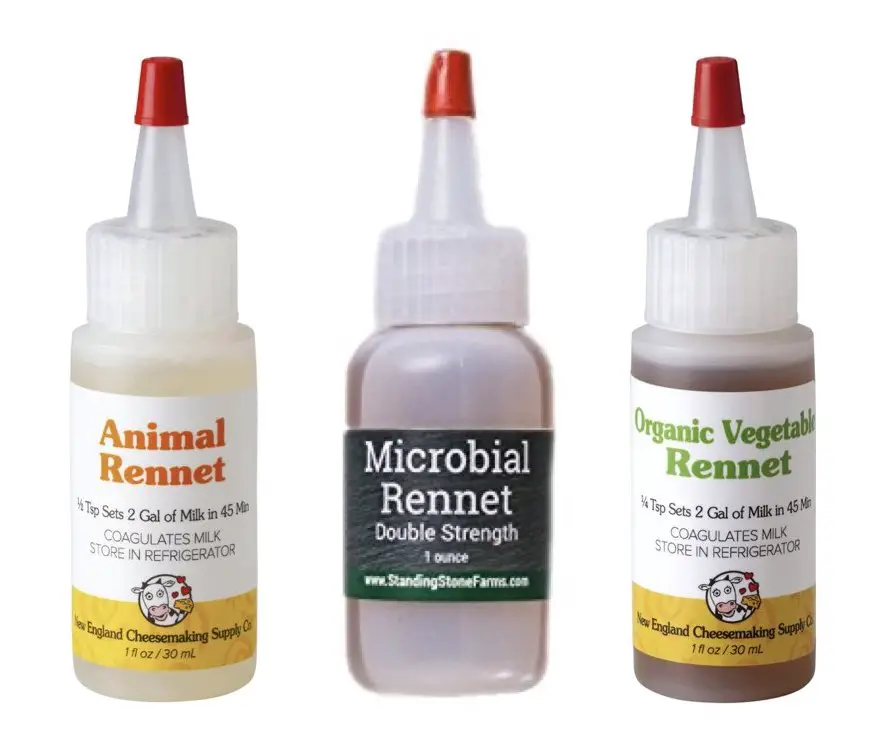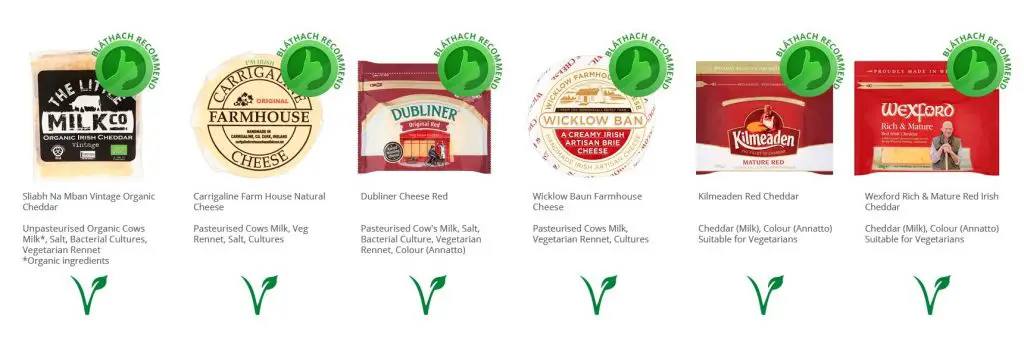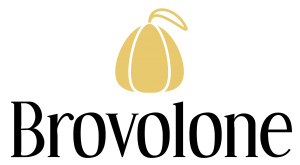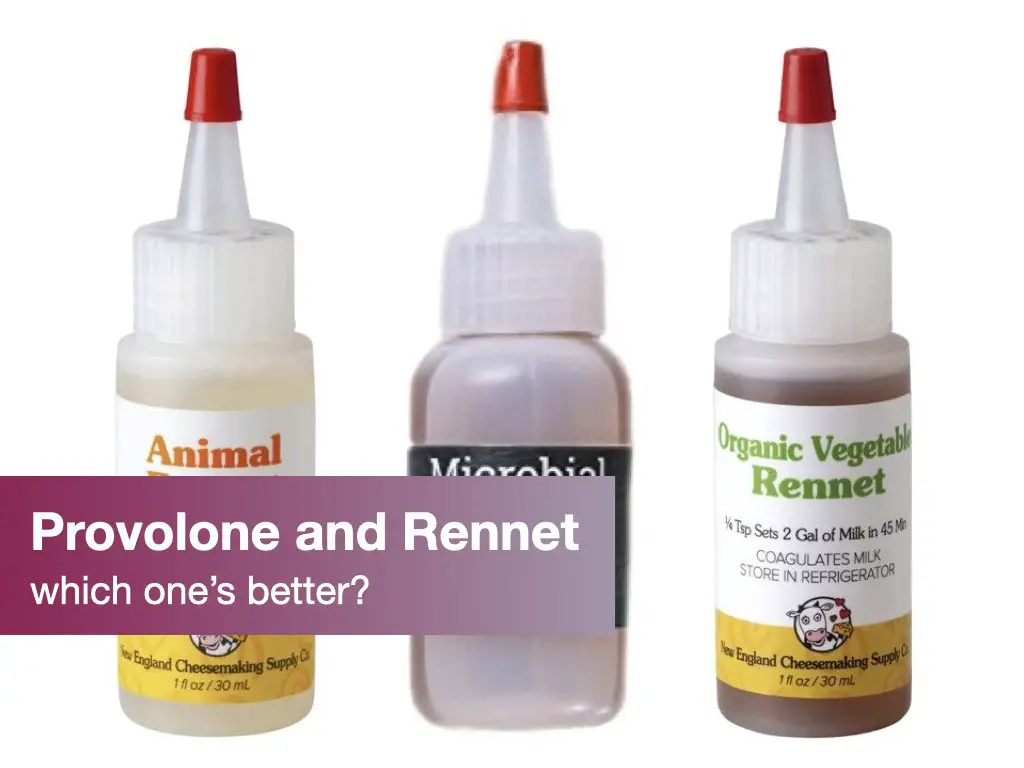All-inclusive Guide: Provolone Rennet (3 Types)
Cheese making is a multi-step complex process that involves several stages of converting a liquid i.e. milk into a solid i.e. cheese.
One of the key components that makes it possible to convert milk into cheese is rennet – the set of enzymes that are naturally present in the gut of mammals.
The key enzyme in provolone rennet is rennin (also referred to as Chymosin) a protease that thickens and coagulates milk.
The first step in provolone making (read how to homemade provolone) starts with converting lactose (the milk sugar) into lactic acid with the help of starter culture. This process changes the pH of milk – making it more acidic thus aiding in thickening of milk. At this stage, rennet is added to further coagulate milk, so curd formed is separated from whey (the liquid part).

Types of Rennet:
Following are primary types of rennet based of source or origin:
- Animal Rennet: Animal rennet is mostly obtained from the fourth stomach of young calves (along the lining of internal mucosa)
Due to limited availability of animal rennet, cheese producers have developed other ways to coagulate milk, from plant sources, microbial agents to fungal agents.
- Microbial Rennet: This type of rennet is ideal for vegetarians as it is produced from the enzymes obtained from bacteria or fungi.
- Plant Rennet: Back in the days, humans used plant sources like fig juice to coagulate milk for cheese-making. Today, there are several plant options available, such as:
- Ashwagandha that also goes by Paneer Booti or Withania coagulans
- Ground ivy
- Mallow
- Artichoke
- Dried caper leaves
- Nettles
- Galium
- Thistles
Plant rennet is produced when these plants are soaked in water for extended periods.
As part of soaking, the thickening enzymes that are similar in function to chymosin are released into the water, which can then be extracted and used for cheese making.
Why plant rennet is not preferred?
Plant rennet is not usually preferred in the production of provolone cheese for two primary reasons:
- The consistency/strength of plant rennet differs significantly depending upon the source of origin and method of extraction which makes it difficult to identify the right dose for cheese making.
- Plant rennet can significantly impact the flavor of cheese. While some consumers prefer the distinct flavor profile of their cheese, others prefer a standard taste. In addition, some options like thistle may impact a bitter flavor to the cheese.
Genetically Modified Rennet (also known as fermentation-produced chymosin or FPC)
This rennet is produced by introducing the Chymosin genetic material (from the animal gut) into a bacterial or yeast culture that behaves like a host.
Yeast culture incorporates the genetic information and reproduce new Chymosin enzymes by the process of fermentation that can be purified from the sample to be used for cheese-making.
Rest assured that the genetically modified organism produced in the process is killed, so fermentation-produced chymosin is 100% GMO free.
FPC has been in use in the commercial cheese-making since 1990s.
In fact, it was estimated that 60% of the entire US cheese production was dependent on fermentation-produced chymosin. More recent data indicates that 80% of the global cheese production relies on FPC.
The benefits of fermentation-produced chymosin
The key benefits of using FPC in commercial provolone cheese production are:
- Higher yield of production
- Lower cost
- Less intense/ or less bitter taste
- Better texture of curd produced
Which rennet option provides the best results?
To choose the right rennet may seem tricky with all these options, but if there is no specific indication or limitation, the genetically modified rennet and animal rennet provides the most consistent results.
Can I still use rennet if I am a vegetarian?
Rennet produced from any non-animal sources is suitable for people who are strict vegetarians or lacto-vegetarians. In addition, rennet obtained from non-animal sources is also comparatively cheaper.
Most manufacturers do not specify on the label if a certain brand of provolone cheese is vegetarian or not.
It is therefore recommended to look for a clear indication such as “V”, “suitable for vegetarians” or trademarks such as “Vegetarian Society Approved”.

Important Tips:
Rennet is activated at a temperature between 85 to 140°F but the best results are achieved when the temperature reaches 105°F
At the pH of 6.4 and temperature of 165°F, the milk mixture separates into curd and whey.
Are there any halal or kosher rennet options?
When it comes to halal status of rennet, there are many popular opinions.
Many scholars believe that if the rennet is obtained from any animal source (other than pigs) that is slaughtered by halal means, it is halal.
Most manufacturers are not required by law to specify the source in the labels. Therefore, if you are unsure about the source of rennet or there is a chance that it may have been obtained from pigs, it should not be consumed.
Rennet from non-animal sources can be used in the manufacturing of kosher or halal provolone cheese.
Today, most halal or kosher provolone cheese producers use FPC or microbial rennet. It is recommended to use vegetable rennet with caution as it may contain extracts from the fungal agent Rhizomucor miehei.
Are there any alternatives to Rennet?
If you think the entire rennet debate is overwhelming or if you are looking for simple alternatives that are available in kitchen to coagulate the milk, following are some options:
- Vinegar
- Lemon juice
Can you make rennet-free provolone at home?
If you are looking to make rennet free provolone, follow these simple steps:
Ingredients:
- Full fat milk (1 gallon)
- Thermophilic starter (1 pack)
- Lipase powder (add it in 1/4 cup of cool water and dissolve it)
- Distilled vinegar or fresh lemon juice (1 tsp)
- Cheese Salt (about 2 lbs)
- Cold water (1 gallon)
Method:
- Heat the milk in a pan without boiling it.
- Once a temperature of 97° F is reached, add starter culture and continue stirring it for 1 minute. Now cover it and let it ripen while still on heat undisturbed for 1 hour.
- Wait until a pH of 6.0 is reached that is acidic enough
- Add lipase and continue stirring it to breakdown the fat content of milk. Cover it and leave it undisturbed for 10 minutes
- Now add a few drops of lemon juice or vinegar (little by little) and keep stirring the milk slowly. Cover it and let it simmer undisturbed for 20 minutes.
- Now slowly increase the temperature of milk mixture (2 degrees per minute) until it reaches 144° F
- Remove it from heat and let it sit for 15 minutes, allowing the mixture to thicken
- Once the right chemical balance is achieved, you will see that milk has started curdling
- Let it sit unstirred for about 15 minutes, so the curdling is complete
- Scoop out the thicken chunks from the whey and set aside to cool while still maintaining a temperature of at least 105°F by placing the curds in a clean colander over warm whey mixture.
- Heat water to about 180°F. now take a chunk of thickened curd, dip in water and see if it stretches. If it does not, wait for 15 minutes and repeat the process until curd starts stretching
- Take out all chunks of curd and make a big ball and place it in cold water
- Now prepare brine by mixing cold water with cheese salt and chill it
- Place the ball of fresh prepared cheese in the chilled brine for 2 hours
- Take out the cheese, dry it with towels and hang it in the ripening area for 2-12 months
Rennet-free Provolone in the United States
Some rennet free provolone cheese brands in United States are listed below:
- Stella provolone
- Kraft provolone
Halal Certified Rennet
Some Halal certified rennet options that are available in the United States are listed below.
- Chy-Max M liquid rennet: This is a naturally fermented, halal and vegetarian-friendly rennet.
- Liquid Vegetable Rennet by Know-How Foods Brand, this one.
- Traditional Rennet by Epicurean
Halal Provolone Cheese
All cheese varieties from Purity Company are halal certified accredited by Jamia Islamia Foundation. In addition, following provolone cheese from following brands is also safe due to use of non-animal rennet.
- Wawa Provolone sliced cheese: Rennet used in cheese making is of non-animal origin
- Provolone cheese from Whole Foods
- Provolone from Daiya
- Provolone cheese from Applegate
- Provolone cheese from Burnett Dairy
- Provolone cheese from Dutch Farms
- Provolone cheese from Happy Farms (ALDI)
- Provolone cheese from Horizon Organic
- Provolone cheese from Joseph Farms
- Provolone cheese from Leprino Foods
- Provolone cheese from Organic Valley
Read more: You should never eat provolone if you have these medical issues.
References:
- Timón, M. L., Andrés, A. I., Otte, J., & Petrón, M. J. (2019). Antioxidant peptides (< 3 kDa) identified on hard cow milk cheese with rennet from different origin. Food research international, 120, 643-649.
- Soltani, M., Sahingil, D., Gokce, Y., & Hayaloglu, A. A. (2019). Effect of blends of camel chymosin and microbial rennet (Rhizomucor miehei) on chemical composition, proteolysis and residual coagulant activity in Iranian Ultrafiltered White cheese. Journal of food science and technology, 56(2), 589-598.
- Manzo, N., Santini, A., Pizzolongo, F., Aiello, A., Marrazzo, A., Meca, G., … & Romano, R. (2019). Influence of ripening on chemical characteristics of a traditional Italian cheese: Provolone del Monaco. Sustainability, 11(9), 2520.

